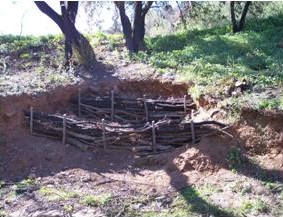Case study:Restoration project in the stream of the Vall d'Horta and surrounds. Natural Park of Sant Llorenç del Munt i l'Obac.: Difference between revisions
No edit summary |
No edit summary |
||
| (2 intermediate revisions by the same user not shown) | |||
| Line 18: | Line 18: | ||
The main objectives of this project are improved post-fire forest structure with the removal of dead wood and selective pruning of some feet; improvement of plant diversity by planting species; improving the dynamics of the stream; promote the area as a recreation space the stream and the home environment of the Muntada; sort the area to prevent environmental deterioration (erosion, loss of soil and plant diversity, etc..); landscape integration of the work done. | The main objectives of this project are improved post-fire forest structure with the removal of dead wood and selective pruning of some feet; improvement of plant diversity by planting species; improving the dynamics of the stream; promote the area as a recreation space the stream and the home environment of the Muntada; sort the area to prevent environmental deterioration (erosion, loss of soil and plant diversity, etc..); landscape integration of the work done. | ||
The project has a total budget of 72.226 € and is financed by the Council of Barcelona and by the Natural Park Sant Llorenç de Munt i l'Obac. | The project has a total budget of 72.226 € and is financed by the Council of Barcelona and by the Natural Park Sant Llorenç de Munt i l'Obac. | ||
Cutting or pruning health of individuals affected by the fire to accelerate natural regeneration. | |||
}} | }} | ||
{{Image gallery}} | {{Image gallery}} | ||
| Line 226: | Line 228: | ||
}} | }} | ||
{{Measures | {{Measures | ||
|Bank and bed modifications measure= | |Bank and bed modifications measure=New bioengineering elements in order to stabilize slope banks, Creation of fish ladders, | ||
|Floodplain / River corridor=Removal of exotic plants, Tree management, | |||
|Floodplain / River corridor= | |||
}} | }} | ||
{{Hydromorphological_quality_elements_header}} | {{Hydromorphological_quality_elements_header}} | ||
Latest revision as of 08:10, 2 June 2017
Project overview
| Status | Complete |
|---|---|
| Project web site | |
| Themes | Environmental flows and water resources, Habitat and biodiversity, Land use management - forestry |
| Country | Spain |
| Main contact forename | Naturalea S.L. |
| Main contact surname | Naturalea S.L. |
| Main contact user ID | |
| Contact organisation | Naturalea S.L. |
| Contact organisation web site | |
| Partner organisations | |
| Parent multi-site project | |
| This is a parent project encompassing the following projects |
No |
Project summary
The work carried out aims to improve the processes of regeneration and improvement of forest structure, minimize erosion, improve the social use, improve the drainage of the stream and the biological connection of a weir with a fish ladder and rehabilitate different habitats.
The main objectives of this project are improved post-fire forest structure with the removal of dead wood and selective pruning of some feet; improvement of plant diversity by planting species; improving the dynamics of the stream; promote the area as a recreation space the stream and the home environment of the Muntada; sort the area to prevent environmental deterioration (erosion, loss of soil and plant diversity, etc..); landscape integration of the work done.
The project has a total budget of 72.226 € and is financed by the Council of Barcelona and by the Natural Park Sant Llorenç de Munt i l'Obac.
Cutting or pruning health of individuals affected by the fire to accelerate natural regeneration.
Monitoring surveys and results
Lessons learnt
Image gallery
|
Catchment and subcatchmentSelect a catchment/subcatchment
Catchment
Subcatchment
Other case studies in this subcatchment: Restoration project in the stream of the Vall d'Horta and surrounds. Natural Park of Sant Llorenç del Munt i l'Obac.
Site
Project background
Cost for project phases
Reasons for river restoration
Measures
MonitoringHydromorphological quality elements
Biological quality elements
Physico-chemical quality elements
Any other monitoring, e.g. social, economic
Monitoring documents
Additional documents and videos
Additional links and references
Supplementary InformationEdit Supplementary Information
| ||||||||||||||||||||||||||||||||||||||||||||||||||||||||||||||||||||||||||||||||||||||||||||||||||||||||||||||||||||||||||||||||||||||||||||||||||||||||||||||||||||||||||||||||||||||||||||||
















